In Search of the Good Family Was Published Where
Carol Briggs placed her newborn son on the bed and removed all of his wearing apparel. She tried to detect herself in his face, searching his mouth, his nose, his eyes. "Non yet," she idea. She saw merely his father. She looked him up and down, making a mental annotation of each of his x tiny toes, chubby legs, puffy abdomen and 2 piffling arms reaching upwards at her. "In my mind," Briggs says, "that was probably going to be the terminal fourth dimension I ever saw him."
It was December. 1, 1972, and a big snowstorm had hit the greater Pittsburgh surface area that week. Briggs had gone sledding with some of the other girls the night before, dragging a cardboard box up and downward a big colina that emptied out right at the Zoar Habitation for Mothers, Babies and Convalescents in Allison Park, Pennsylvania. She woke upward in labor around 2 a.yard., and just 32 minutes after, she was a female parent. She named her babe Jon Kenneth Briggs.
Her parents and older brother drove the hr from her hometown of Youngstown, Ohio, to exist with her at the infirmary. Afterward cleaning out her room at the maternity dwelling and signing some papers, she was back in Ohio the next day, fix to resume her life as a 16-twelvemonth-old high schooler and National Honor Society member.
No one exterior of her firsthand family unit and her cousin Robin knew near the baby. Merely when she was preparing to sign the adoption papers did Briggs consider sharing the news with the father, a teenage fling who had gone off to higher before she discovered she was pregnant. She ultimately decided against it.
"He was a kid too," she says. "He was off at college on a scholarship. I think I may have felt that I kind of got myself in this, I'm gonna practice what I need to exercise to piece of work my fashion through it."
With her parents' approving, Briggs had decided that when the child was born, she would put him up for adoption.
"My mother was still cleaning upwardly my room for me once a calendar week," she says. "I wasn't in a position to be anybody's female parent. I thought this was best for him, that I permit him to be placed with some family that would be able to give him all the great things that I had coming upwards considering I had a mother and a father. I just didn't want him to get cheated out of anything."
In her last interaction with the adoption agency, Briggs was told that baby Jon had been placed with a doctor and his wife in Columbus, Ohio.
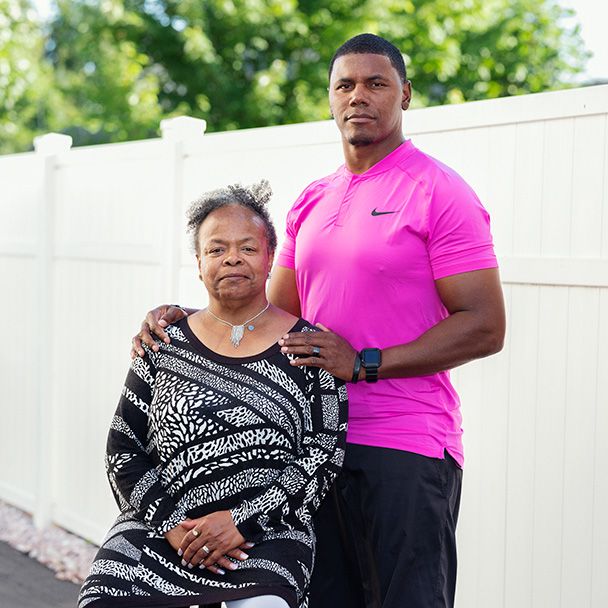
Adelle Comer adopted her son Deland McCullough in 1973 when he was six weeks old. Ruddy Roye for ESPN
IN EARLY 2017, at present-Kansas Urban center Chiefs running backs coach Deland McCullough signed on to coach the running backs at USC, having spent the previous six years in the same position at Indiana University.
A few months before making the move to southern California, he and his wife, Darnell, welcomed their fourth son into the world. For the quaternary time, the couple provided doctors with Darnell's medical history simply couldn't practice the same for Deland's side of the family unit. At 44 years onetime, McCullough knew nothing about where he came from.
Growing upwardly in Youngstown, his adoptive mother, Adelle Comer, could tell him only that he was adopted at a very young age and that she had no information virtually his nascency parents. For a long time, that was plenty. McCullough wasn't interested in finding them anyway. There was plenty trouble in Youngstown those days, and he didn't want to brunt anyone who might accept bigger things to worry most.
Things changed when he had his kickoff kid, and as his family unit grew, and then likewise did his desire to know of his by. He wanted to know who gave him his deep voice and his muscular build and to whom he owed his pensive nature and tranquility intensity. He wondered where son Dason got his height and which grandfather or uncle his bespectacled son, Daeh, might favor. He was and then hungry for data that he never questioned whether the search might atomic number 82 him to answers he couldn't handle.
"I didn't know what was going to happen," McCullough says. "I didn't know how people would receive things one mode or another. I didn't take a program. I just knew I wanted to notice out."
New laws in Ohio and Pennsylvania had called for the unsealing of adoption records, giving McCullough new hope that he might find his birth parents. In Nov 2017, more than than a year after filling out the requisite paperwork and years after his search began, he finally received his adoption files in the postal service. For the first fourth dimension, he saw his original birth certificate, complete with his name, Jon Kenneth Briggs, and the name of his mother, Carol Denise Briggs.
There was no information nearly his father.
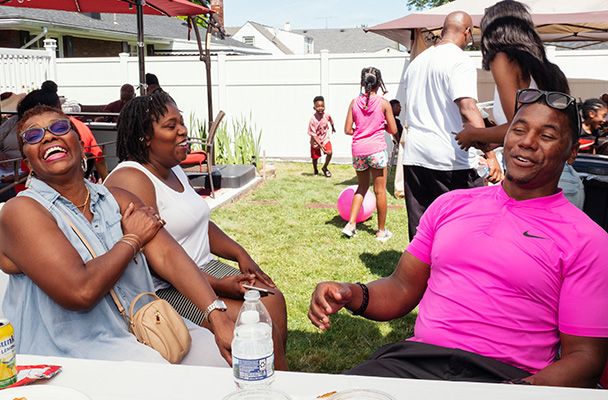
Carol Briggs, far left, was a 16-year-old high school pupil when she gave birth to her son, Deland McCullough. Red Roye for ESPN
ADELLE COMER WAS living in a three-sleeping accommodation house on a cul-de-sac in Youngstown with her husband, popular local radio host A.C. McCullough, and their young son, Damon, when she got the call. It was a social worker reaching out to come across whether she and A.C. would come come across an babe at an adoption agency in Pennsylvania. Not long after the tragic death of their second son, Alex, who died of an intestinal nascency defect after just 28 days, the young couple had started serving as foster parents, and they were looking to adopt. In January 1973, they met six-week-erstwhile baby Jon.
"He was asleep in a bassinet," Comer says. "And she put him in my arms, and when he woke upwards, his eyes were looking straight at me. Information technology was instant connection. Beloved. Mother-son."
By March of that yr, Jon Kenneth Briggs had been renamed Deland Scott McCullough, and he was living at abode with his new parents, Adelle and A.C.
"We were still in honey, a skilful couple," Comer says. "We went to church building, partied, went to cookouts. We were working together and doing this together and wanting to make a dwelling for our children. We knew that God'southward hand was in it. Deland came so fast to u.s.. We knew that information technology was meant to be. Both of us."
But things changed speedily. Comer's father had a stroke, and though A.C. wanted to put him in a nursing domicile, Comer brought her dad to live with the family unit in Youngstown. Their matrimony deteriorated, and when Deland was just 2 years old, A.C. moved out.
"They went through a lot of hurt and disappointment, but they took information technology," Comer says of her sons. "I said, 'God gives y'all an example of what to be and what not to exist. You lot have to make the choice.' And that'south all I had to say, and they got it."
When Deland was in elementary schoolhouse, Comer came domicile to notice that he had cutting three gashes into the burrow for which she had just finished two years of layaway payments. Kids at school had been teasing him almost beingness adopted, and he accused Comer of loving him less than her birth son, Damon. She explained that she loved the ii boys differently, one considering he had been in her belly and the other because she had called him. After that, Deland McCullough rarely spoke of his adoption. He got proficient at pretending to be whole.
"The void was at that place," he says. "I wish that information technology wasn't, only I think I did a skillful chore of hiding it."
Afterwards the divorce, Comer had relationships with a few other men, some of whom were antagonistic and abusive. "Some men don't sympathise what respect is," she says. "I've got two sons, and I'one thousand not gonna allow my children to grow up with this type of lifestyle, this drama."
Damon sometimes tried to physically defend her, but and so he left for college, and Deland felt too small, physically and emotionally, to pace in. His response to the violence was to attempt to tune information technology out, become emotionless, put blinders on and dream of a way out of the house and out of Youngstown.
Comer acknowledges that she contributed to the chaos in her own way every bit well.
"Biggest drama queen in the world, OK?" she says. "They called me Ma Barker because I'd shoot y'all and inquire questions later."
Comer took Deland with her to therapy for a while, hoping to make things at home a petty less turbulent. New boyfriends came and went, but she generally settled into life as a single mom, taking on multiple jobs to support her sons, including as a switchboard operator at the Cuyahoga Canton Department of Human Services, a waitress, a social worker and a short-order cook at the local bowling alley. She did her best to rear the boys on her ain, just they moved a lot, and she struggled to pay the bills, sometimes having to choose between electricity and a working telephone.
Simply Comer stressed the importance of an education, insisting that she encounter the boys' homework to make sure they were taking it seriously. She taught them the value of a dollar and the importance of faith, demanding that they utilize a portion of their monthly kid support for Dominicus school and tithes at church. And she was always shuttling them to activities, from the theater plan at the Youngstown Playhouse to football, basketball and rail practices.
Deland was a bit of a tardily bloomer in terms of talent, but the passion for football game was ever there. Early on in pee wee, he heard his name over the loudspeaker and a light went off in his caput. He savage in dearest with the game and started conveying a football game with him everywhere he went, fifty-fifty to bed.
"It was an escape," he says. "When I was out there practicing, you didn't remember well-nigh the electric is off, yous know? You didn't even think near anything like that. Yous were only out there balling, doing your affair and competing and bonding with your friends."
Comer was a one-woman cheer squad, bringing multiple signs to Deland's games and running upwardly and down the sideline rooting him on. One nighttime when her ride didn't show up, she took her son'due south moped to the game. He looked up in the stands and saw her, however wearing his moped helmet, hollering and screaming for him: "D-MACK! D-MACK!"
As a inferior defensive back, Deland saw himself playing football at a small schoolhouse or enlisting in the Navy, but an opportunity to show his talent at the running back position his senior year drew the center of college recruiters. Suddenly, he was existence pursued by the likes of Jim Tressel, and then the head charabanc at Youngstown Land; Bob Stoops, so the defensive backs omnibus at Kansas Land; and Sherman Smith, then the running backs coach at Miami of Ohio.
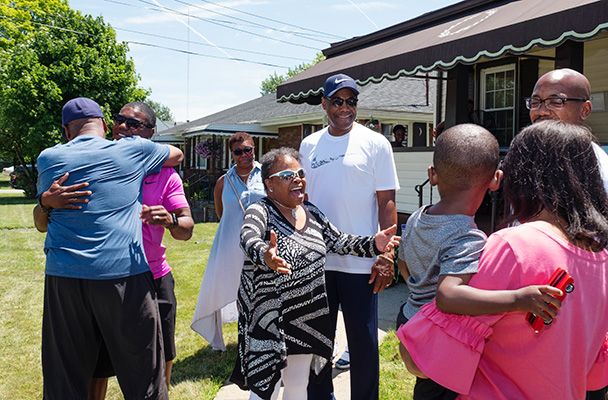
Adelle Comer raised her sons as a single mother, teaching them the value of teaching and faith. Reddish Roye for ESPN
DELAND MCCULLOUGH LOOKED out the window of his 3rd-period English language form at Campbell Memorial High School and saw a alpine man emerge from a processed apple tree red Mercedes-Benz with tan interior and tricked-out golden rims. A few minutes later, he got a pink slip bulletin to leave class and go to the office, where the tall human stuck out his hand and said, with a house handshake, "I'm Sherman Smith, the running backs coach at Miami University."
A former star quarterback at Miami, Smith was a second-circular draft pick at running dorsum for the Seahawks and went on to play eight years in the NFL. He had a booming voice, thick arms and broad, square shoulders. He walked and talked and carried himself like a quondam pro; McCullough was immediately drawn to him.
"It was merely something nigh his personality," McCullough says. "The style he presented himself. He had things that I hadn't seen out of a man or mentor. He was on top of his details. He was successful. He had played in the NFL. He got his degree. I wasn't effectually that type of person.
"The Mercedes was nice, too, you know?" he laughed. "That was slick."
Every bit a Youngstown native himself, Smith thought guys from the area were tough, only the coaches told him McCullough was special -- a sparse kid, but when he couldn't run around people, he'd go through them. McCullough was serious that day in the office, offering few smiles and answering with a lot of "Yes, sir" and "No, sir," but he was as well intelligent and expressive. Smith thought he'd very much like to work with him.
The feeling was mutual. Despite interest from other schools, the decision to nourish Miami Academy was like shooting fish in a barrel for McCullough, especially after the domicile visit, during which Smith charmed Comer likewise.
"Well, Jitney Smith was hard not to honey," Comer says, laughing. "I fell in love with him the outset time. He was merely a gentleman. And he was very circumspect and respectful to me."
Smith drove them to visit the school and was back at Campbell Memorial a few months later for signing 24-hour interval, when McCullough signed his alphabetic character of intent to play at Miami. When McCullough arrived on campus, the coaches tried to turn him into a wide receiver, but he pushed for an opportunity to work with Smith and the running backs, accepting a redshirt freshman year to pursue the position he believed he was meant to play.
"I would tell the players, 'Yous may not exist looking for a father, but I'm going to treat you lot similar y'all're my sons,'" Smith says. "And so I just looked at every guy like my son. I merely wanted to be a positive role model for Deland and exemplify what I thought my father exemplified for me."
"He was everything," McCullough says. "If annihilation was going on, I was going to talk to Coach Smith. Everybody in that room gravitated towards Coach Smith but because that'southward the type of person he was. What he's nigh rubs off on you lot, and so I always wanted to be effectually that."
Smith left Miami University after that season to be the tight ends coach at the University of Illinois, but he and McCullough stayed in impact. He watched from afar as McCullough put together a Hall of Fame career in Oxford, rushing 36 touchdowns and setting a school tape with 4,368 rushing yards. McCullough was surprised when his name wasn't called in the 1996 draft, but he was invited to a few workouts and concluded up signing with the Bengals. He was leading the NFL in preseason rushing before he suffered a flavor-ending knee injury in Cincinnati's last exhibition game. After a few more looks in the NFL, a couple of seasons in Canada, several more than knee joint surgeries and a cursory flirtation with the XFL, McCullough finally accepted in 2001 that the dream of pro football was over.
A few years later, married and the father of one son, McCullough took a task teaching communications and coaching football at Harmony Community School in Cincinnati. Despite rising to the ranks of principal and making a adept salary, his first taste of coaching gave him the crawling to coach full time, and he reached out to his alma mater well-nigh an opportunity to join the staff.
Smith had followed a similar path, first education and coaching high schoolers, then working his way upwardly the ranks from Miami University to the University of Illinois, the Houston Oilers, the Washington Redskins and, finally, the running backs coach for the Seahawks. He was with Seattle when he got a phone call from McCullough, asking for advice as he started his new job at Miami Academy.
By 2014, McCullough was coaching at Indiana University, and the two were reunited on the field, as Smith welcomed McCullough to Seattle for a coaching internship. He saw firsthand that his former actor had a real time to come on the sideline. He had no idea that off the field, McCullough was consumed by the search for his family.
A FEW DAYS before Thanksgiving 2017, Carol Briggs got dwelling house from work, sabbatum downward on the couch and opened a Facebook message from an unfamiliar human being: "Did yous accept a baby in 1972 in Allegheny County that you placed for adoption?"
"Luckily, I was already sitting," she says.
Briggs had thought oftentimes of babe Jon. Every year, she wished him a "Happy Birthday" on her Facebook wall, and she regularly searched adoption websites to see if he might be looking for her. Briggs could still hear her mother's phonation, saying more and more often in the years before she died, "You need to observe that boy." Never married and without whatever other children, Briggs would joke to her cousin Robin that ane solar day infant Jon might show upward at her door and walk in to find her home lone, dancing around the house to Funkadelic.
She called her older brother, who warned her that the message might be from someone trying to bribe or extort her. She responded anyway, and afterwards a few brusk messages, she agreed to speak to McCullough on the telephone that night later on he got out of practice. In the hours before the phone call, she Googled his name and read every article she could find. She stared at his pictures and tried to observe herself in his confront. It wasn't difficult to see information technology now: the rima oris, the nose, the eyes.
McCullough called Briggs from a hallway at USC every bit he awaited the commencement of a football family dinner.
They spoke as if they'd known each other for years, an piece of cake back and along equally they shared where life had taken them in the 44 years since she'd laid him downwardly on that bed and permit him go. She learned that he had never gone to alive with a doctor in Columbus, that in fact they had been but a few miles away from each other in Youngstown for all of McCullough's babyhood. She likely shopped at the same grocery store as Adelle Comer, peradventure even passing immature McCullough in the aisles. She was certain that her sports-fanatic father, now deceased, had read about McCullough's high school exploits in the paper.
McCullough was overjoyed to find his birth mother, though a mother had never been what he was missing.
"Within probably the first five or six minutes, he says, 'Who is my father?'" Briggs says.
She took a jiff. She had probably told simply three people the homo'south name. After making the determination to not tell the father all those years ago, she had been determined to never let him acquire of the baby years later because of devil-may-care gossip.
She hesitated just decided McCullough had a right to know.
"Your father's name is Sherman Smith," Briggs told him.
McCullough, leaning confronting a wall in the hallway, felt every bit though he might laissez passer out.
He started flashing back to all of his memories with Smith and all the times people had joked about him being a carbon re-create of his coach. Throughout higher, when he returned to passenger vehicle at Miami Academy, during his internship with the Seahawks.
"'Man, you and Coach Smith look alike.' 'Human being, you all walk alike.' 'Y'all this, yous this,'" McCullough says. "There'southward no reason to connect those dots because you weren't fifty-fifty thinking about them. A sense of pride that went through me, similar, 'Wow, that explains these things.' And then I also first thinking about all the similarities of our path. That just blew me away."
Not only had he known his father for 28 years, but Smith was also his mentor, the man he had looked up to since he was 16 years old. McCullough idea of a photograph of him and Smith at Campbell Memorial High, both beaming every bit he signed his letter of intent to play at Miami University. The same photograph he had pinned to the corkboard that hung in his college dorm room. The same photo that was at that moment sitting in a Ziploc handbag in the drawer of his nightside table, a bag that had traveled with him through every task and every move.
"If you would accept told me to choice who my father was, there's no way I would have picked him considering I might have thought I wasn't worthy for him to exist my begetter," McCullough says. "I felt similar my blessings came full circumvolve because I'd always wanted to exist somebody like him."
"I could hear him have a big breath," Briggs says. "And I could kind of hear him choke upwardly a little. And finally he says, 'Well, I've known Sherman my whole life.'"
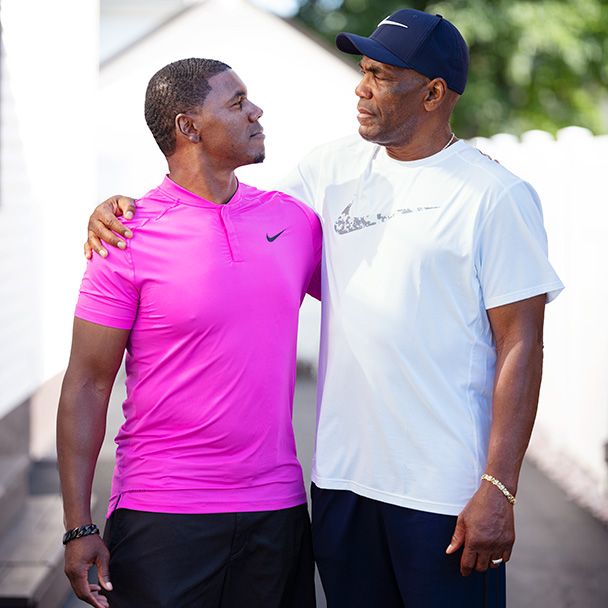
Earlier learning most his genetic human relationship with Sherman Smith, little did Deland McCullough know that he'd known his biological male parent for 28 years. Ruddy Roye for ESPN
THE Adjacent Forenoon, McCullough texted Smith asking if they could talk about something important. It was Nov, and Smith assumed that McCullough had gotten a coaching opportunity he wanted to discuss. Instead, McCullough began by talking about his search for his birth parents, how he had plant his biological female parent, and she was from Youngstown, but like them.
"Praise the Lord!" Smith recalls saying. "What a approval!"
"And then he said, 'I asked her who my biological father was, and she said you lot.'"
Smith was quiet. Sixty-three years old, he had been married to his college sweetheart for 42 years and had reared a grown son and a girl. He hadn't heard the name Carol Briggs in more iv decades. He never knew she was pregnant, never knew there was a infant. He knew he couldn't deny the possibility that he was McCullough's begetter, but he wanted proof. Fifty-fifty more, he wanted time to recollect. He asked McCullough if he could phone call him back later. Stunned and a little hurt, McCullough agreed.
Smith sat in his office. Guilt done over him. Even though he hadn't been told about the baby, he couldn't shake the feeling that he had let Briggs and McCullough down. He felt awful that he had left Briggs in such a difficult position and regretted all the years he had missed out on existence a father to McCullough. He had built a life making a divergence in young men'south lives. He had spoken to his athletes and his kids about being responsible, being accountable.
"Beingness irresponsible is not neutral," Smith says. "When you're irresponsible, someone becomes responsible for what y'all've been irresponsible for."
He thought about what this would say about him as a homo and found himself hoping that a paternity test would show that he wasn't McCullough's father. It was a thought that brought him only more guilt.
He asked to speak to Briggs.
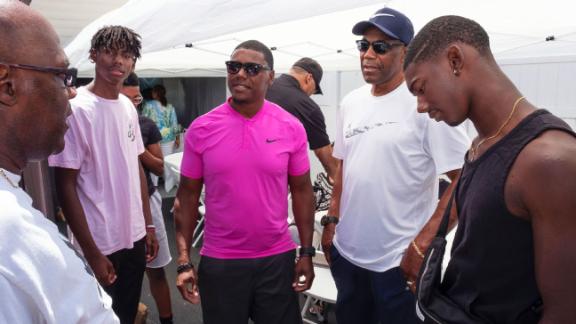
How an NFL autobus constitute his family
Eastward:threescore tells the incredible story of Chiefs running backs coach Deland McCullough'due south search for his biological parents.
Briggs cried her style through piece of work the 24-hour interval she was gear up to talk to Smith. "I hadn't talked to Sherman in 45 years. And afterwards 45 years, this is probably not the icebreaker conversation that you lot want to have with the guy that you used to fool effectually with. 'Hey, nosotros've got a 45-year-old son. And how are you?' And so, no, I wasn't looking forward to that at all. Non at all."
At that place was no need to worry. Smith was calm and kind, and the two settled into a prissy conversation, catching upwards for a long time before they fifty-fifty got to talking about McCullough. Smith apologized to her for her having to make such a hard conclusion at such a young age, and Briggs explained why she had felt it was best to not tell Smith virtually the baby. She said that over the years, she just wanted to know that McCullough was OK, and Smith reassured her that her son was a good human being.
Briggs hung up full of emotion but relieved that Smith wasn't aroused with her. Smith hung upwards feeling much more certain that McCullough was his son.
Smith talked to his married woman, Sharon, and his brother, Vincent. He talked to his children, Sherman and Shavonne. He thought almost McCullough's coaching internship a few years earlier, how Seahawks assistant offensive line coach Pat Ruel hadn't stopped not bad jokes about Smith and his protege acting like a male parent-son duo.
McCullough sent Smith an old article from his days in the CFL, and Smith couldn't believe his optics. "I'k looking at this affair and thinking, 'I don't retrieve taking this movie. I don't remember doing this commodity,'" Smith says. "I'm looking at Deland, and I'grand thinking it's me. That got me.
"I chosen my aunt in Youngstown, and I told her most it. And she'd went on YouTube and pulled upward some pictures of Deland, and she chosen me back. She said, 'Nephew, I can save you lot the coin on the DNA tests.'"
The more Smith thought nearly it, the more than he realized the story wasn't about him and his guilt. Information technology was about McCullough and what he had been through. It was about a life without a male parent, about the years McCullough had spent looking for his birth parents, hoping to fill a void, wanting to know where he'd come from.
"It was said that humility is not thinking less of yourself, it's thinking of yourself less," Smith says. "I started thinking virtually Deland."
Sometime in the weeks betwixt that starting time telephone call and the test results, Smith realized that he was hoping he was McCullough's father. That, in fact, he would exist devastated if the results came back otherwise. When the test came in, it showed a 99.99 percent chance that Smith was, indeed, McCullough'southward father. Both were elated.
"I look at it, and I but say information technology's a God thing," Smith says. "It's grace. It's undeserved. And that's what's made it peachy for Deland and for all of us, how everyone has embraced this and is excited most our new family."
McCullough understood why Smith had been so curt at first. McCullough had spent his whole life wondering about his nascency parents. Briggs had spent her whole life wondering about her child. Smith had gone from naught to a 45-twelvemonth-old son in i telephone call; he needed time.
A few weeks after the paternity examination came back, McCullough had a recruiting trip nearly Nashville, where Smith and his wife had relocated afterward his retirement. McCullough fabricated a special trip to see the man he now knew as his begetter.
"I'grand pretty sure he was nervous," Smith says of that twenty-four hours. "I laugh considering I'm looking out the window because I know he's supposed to be coming. I'm standing there, and I run across he parks at the corner downwards in that location. And he'due south parked in that location for five minutes. I said, 'What'due south he doing?' He finally pulls upward and gets out the car."
Every bit McCullough walked upward the steps to the house, Smith greeted him with open arms and said, "My son." It was the starting time time in McCullough's life that anyone had chosen him that.
"For so many years that I was around him, the embrace was, 'Hey, Coach, how you doing?'" Smith says. "Just this is, 'Man, my son.' Peradventure I was doing information technology for me, to help me actually, fully understand."
"I know he was saying information technology from a identify of 'I'g proud. This is my son,'" McCullough says. "I'd never heard that. I'd never been referred to like that before -- menstruation. It really striking me hard emotionally. When I sit here at this point, and I'm looking at the things that I've done, I'm happy that I'chiliad able to be somebody that he's proud of."
At offset, McCullough was concerned that his adoptive female parent might exist upset by his relationships with his birth parents. But every bit soon as he heard that Briggs and Comer had hitting it off in their first telephone call, he knew everything would be fine.
"All I tin can say is, 'Are you serious?' Over and over again. 'Are you serious?'" Comer says of McCullough's journeying leading to Smith. "It's just a miracle that his nativity begetter'southward been in his life since he was 16, 17 years old. That's my son, and I desire nothing but 100 percent best for him. He needed that, and God gave information technology to him, and information technology'south in God'southward time."
Both Smith and Briggs are incessantly grateful to Comer for raising McCullough with the wisdom they didn't still take.
"She did what I couldn't do," Briggs says of Comer. "She was an adult, she was married at the time, so you lot know she brought him into a family structure. That was what I wanted for him. I wanted him to accept what I had, and she gave him that. She gave him all the tools that he needed in growing up to be the successful man that he is right at present."
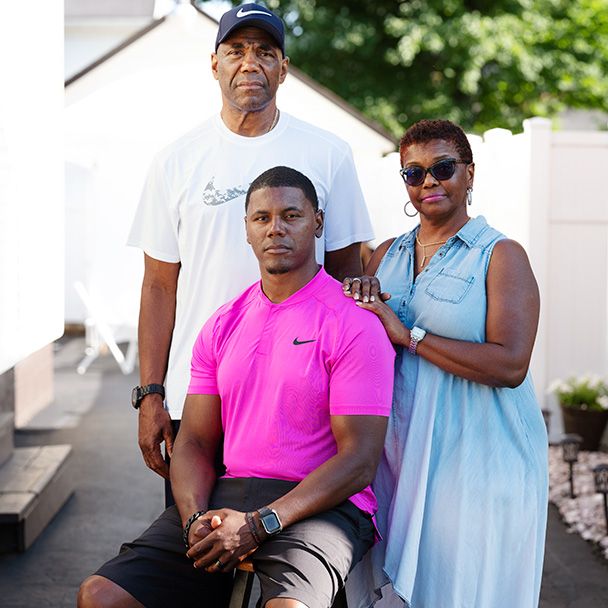
"Now I know who I am and where I'm from," Deland McCullough says of finding his biological parents, Sherman Smith and Ballad Briggs. Ruddy Roye for ESPN
THIS By JUNE, the two Miami Academy Hall of Famers, Smith and McCullough, were back on campus to witness the exact commitment of McCullough's son, Deland McCullough 2, to the RedHawks football team. The younger McCullough is a defensive back, just like Smith's son, Sherman, who played the position at Miami as well.
In July, a huge family unit reunion in Youngstown brought McCullough, Briggs, Smith and Comer together for the first time. All of McCullough's parents in one identify, reflecting on nurture versus nature, what is inherited versus what is taught and the many different forms of parenthood. It was both the culmination of a journey and the outset of something new for the families that the journeying had introduced. A man plant his parents, a female parent found her child, and a father discovered a son he never knew he was missing. There is no jealousy, no resentment and no regret. There is just gratitude for the winding paths that brought them all together.
"When I look at Deland, the type of guy he is, it was a souvenir to the states," Smith says. "And to remember -- Deland felt we were a gift to him."
"At present I know who I am and where I'thousand from," McCullough says. "I got all of the pieces to the story. I got them all now."
Sarah Spain is the co-host of Spain and Company on ESPN Radio, host of the That's What She Said podcast, a SportsCenter reporter and an espnW columnist since 2010. She was a heptathlete at Cornell and is a lifelong Chicago sports fan.
Source: https://www.espn.com/espn/feature/story/_/id/24505521/the-jaw-dropping-story-nfl-coach-search-family
0 Response to "In Search of the Good Family Was Published Where"
Post a Comment